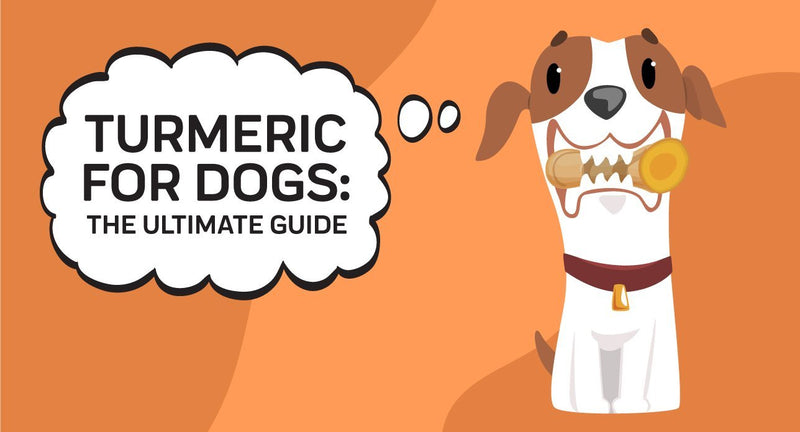When your dog is in pain all you want to do is help them as fast as you can. Nerve pain and seizures in your best friend can break your heart when you don’t know what to do.
But you can ease the suffering if you know what your dog needs to stay happy and healthy. Vets have all sorts of solutions for different illnesses, and a common treatment for seizures and pain in dogs is Gabapentin.
When your vet prescribes Gabapentin, it can be overwhelming and confusing if they don’t have time to fully explain the drug. In this article, we will break down every question you could have, and explore whether the use of Gabapentin is the right choice for dogs' experience with chronic pain.
- What Is Gabapentin?
- Is Gabapentin Safe For Dogs?
- When Is Gabapentin Prescribed For Dogs?
- Gabapentin Dosage For Dogs
- Possible Gabapentin Side Effects In Dogs
- Alternatives To Gabapentin For Dogs
- Do The Best For Your Pet

What Is Gabapentin?
Gabapentin is a medication that is commonly used to treat seizures and chronic pain in dogs. It works by inhibiting the transmission of pain signals along the nerves. Gabapentin is also sometimes used to treat anxiety, although this is less common.
The exact mechanism of action is not fully understood, but it is believed to work by binding to a specific site on the nervous system and modulating the activity of GABA, an inhibitory neurotransmitter.
Gabapentin treatment typically begins with a low dose that is gradually increased over time as needed. Side effects are generally rare, but may include sedation, vomiting, and diarrhea.
Gabapentin is generally safe and effective for most dogs, but as with any medication, there is always the potential for side effects. If you are considering gabapentin treatment for your dog, be sure to speak with your veterinarian first to make sure it is the right option for your pet.
What Is Gabapentin Used For In Treating Dogs?
Gabapentin is a drug commonly prescribed in veterinary medicine used to treat seizures, chronic pain, and nerve pain. Often given to humans with these symptoms, vets have recently begun prescribing it for dogs in distress as well. Although, you should know that Gabapentin is not FDA approved in dogs and is given “off-label.”
Gabapentin is a medication that is commonly used to treat pain in humans. However, it can also be used to treat veterinary patients, particularly dogs. Gabapentin works by reducing the ability of neurons to perceive pain. This makes it an effective pain medication for both humans and dogs.
In addition, gabapentin can also be used to treat seizures in dogs. Seizures are caused by abnormal electrical activity in the brain, and they can be very dangerous. Gabapentin helps to prevent seizures by reducing the excitability of neurons. As a result, it is an important medication for both humans and dogs.
Veterinary medicine has come a long way in recent years, and there are now a number of effective treatments for conditions that were once considered incurable. One such condition is epilepsy, which affects both humans and animals.
While there is no cure for epilepsy, gabapentin can help to control and treat seizures and ease the symptoms of the condition. It is typically used as an adjunctive therapy, which means it is usually given in conjunction with other seizure medications. Gabapentin is also used in conjunction with other pain medications, as it is effective in treating neuropathic pain.
In addition, gabapentin can also be used to treat anxiety and depression, both of which are common side effects of epilepsy. As a result, gabapentin can be a valuable tool in the treatment of epilepsy in dogs.
Gabapentin does not just block the pain receptors in the brain but fully relaxes the whole nervous system to stimulate deeper healing. This can make Gabapentin for dogs is a good choice for pain management when you need long-term care.
Is Gabapentin Safe For Dogs?
Like most medications, the use of Gabapentin for dogs is safe when you are closely monitoring the dosage and strength as prescribed by your vet. In general, this drug is considered safe for dogs and a good way to treat serious issues.
It is important to treat the right conditions with the right medication. If your dog has been diagnosed with depression or insomnia, make sure your vet knows this, as Gabapentin could be too strong when combined with medications for these conditions. However, it is important to be aware of potential drug interactions before giving this medication to your dog.
Never give human-grade Gabapentin to a dog as it contains Xylitol, which is toxic to dogs. Even small amounts of Xylitol can be extremely harmful, possibly leading to death. If you run out of your vet-prescribed medicine early, do not supplement it with anything but what your vet has approved.
The bottom line is that you always need to consult your vet and place your dog on a plan that is tailored to their specific needs.
Is Prescribed Gabapentin Safe for Senior Dogs?
Gabapentin is a veterinary medicine that is commonly used to manage chronic pain in dogs. It is safe, effective, and has fewer side effects than many other pain medications for senior dogs.
Gabapentin works by inhibiting the release of neurotransmitters that lead to pain signals. This helps to reduce the perception of pain and can provide significant relief for dogs suffering from arthritis or other degenerative joint diseases.
Additionally, gabapentin can help to reduce inflammation and swelling associated with chronic pain conditions. It is important to talk to your veterinarian before starting any new medication, but gabapentin is generally considered safe for senior dogs. When used as directed, it can provide significant relief from chronic pain and help improve quality of life for your aging dog.
When Is Gabapentin Prescribed For Dogs?
Since Gabapentin can be used to treat so many conditions, from arthritis to seizures, there are many situations when it is appropriate.
When dogs are recovering from surgery this drug can ease the pain and speed the healing process. A relaxed animal is less likely to pull out stitches or cause secondary complications from surgery. Due to its calming effects, Gabapentin can even be given to a fearful pup before a trip to the vet.
Gabapentin is also a known way to ease the symptoms of refractory seizures (seizures which haven't responded to other medications) and epilepsy. It may be prescribed on its own or alongside other antiepileptic drugs.
It is also used in the treatment of chronic pain in dogs, especially that deemed to be of neuropathic origin. It's thought to be most effective when used in conjunction with other analgesic agents like nonsteroidal anti-inflammatory drugs (NSAIDs).
Gabapentin Dosage For Dogs
For whatever reason your dog needs Gabapentin, you must make sure you’re giving the proper amount. The condition your dog is experiencing will affect the dosage levels. For example, the amount needed to treat seizures should not be equated with nerve pain.
You and your vet need to work together to understand what your buddy needs. Gabapentin for dogs generally comes in smaller 100mg and 300mg dosages — the exact dose will correspond to your pet's build and illness. Larger breeds in general need larger doses than small pups. Height, weight, and breed all contribute to figuring out the proper dosage.
Once your dog starts taking Gabapentin, it gets to work fairly quickly. Within one hour you should begin to see results, e.g. they behave more like their normal selves when not in distress. If they are still exhibiting pain symptoms after an hour or two after the dose was taken, do not administer another dose of the medication without consulting your vet.
One downside of Gabapentin is that it typically wears off in about 24 hours, meaning it may need to be administered every day to maintain results.
The medication is administered in pill form and works the fastest on an empty stomach, but if your dog has a hard time swallowing pills, then they can be taken with food as well.
Generally, a vet will start with the smallest dosage and adjust until the drug is working properly. You and your vet will determine the maximum possible dosage to prevent overdose from this drug.
Possible Gabapentin Side Effects In Dogs
Every medicine is going to come with some side effects. Understand the side effects of this drug so you don’t mistake the signs with something else.
Ask your vet if your pet is at high risk for any of these possible negative reactions:
- Lack of coordination
- Vomiting
- Extreme lethargy
- Depression
- Diarrhea
While intense side effects are rare, at the first sign of these serious symptoms you should cease giving Gabapentin and call your vet. You may have to alter the dosage levels or even find another drug or pain management option.
Let your vet know any and all drug allergies your dog has as well as their full medical history. This is especially important if your dog has kidney disease or has had renal failure in the past. Discuss a full medical history as well, especially any kidney issues or past renal failure. The vet will also need to know any other medications or supplements your dog takes, as Gabapentin could complicate or interfere with other substances.
Keep your eyes out for the possibility of an overdose. While generally not too dangerous, here are the main symptoms to be on the lookout for:
- Sedation
- Sudden diarrhea
- Oversleeping
- Bulging eyes
- Falling over
If your pup exhibits any side effects from taking this drug, weigh the effects of Gabapentin for dogs against the possible consequences. Only give your fluffy friend what you and their doctor think will make them feel better and happy, and drugs are not always the answer!
Most Common Side Effects of Gabapentin
When it comes to your furry friend, you only want what's best for them. So when your vet prescribes the veterinary medicine Gabapentin, you want to make sure you know all there is to know about the medication.
Gabapentin is a very safe medication, so there are very few adverse side effects related to it. Most commonly seen is sedation and stumbling. Starting at a lower dose and then gradually increasing may help reduce this effect.
Is it Safe to Stop Gabapentin Suddenly?
If you're thinking about stopping Gabapentin for your dog, it's important to be aware of the potential risks involved. Abruptly stopping the medication could make your dog's symptoms worse, and in some cases, it could even be dangerous.
Withdrawal seizures are a possibility if you quit suddenly, so it's important to speak to your veterinarian first. A missed dose here and there is not usually a problem, but if you miss a scheduled dose it's important to give the next one as soon as possible.
And finally, be sure to follow the dosage instructions carefully - giving your dog too much or too little of the medication can have serious consequences. With all that being said, Gabapentin is generally a safe and effective medication for dogs, so don't be afraid to ask your vet about it if you think it could help your furry friend.
Alternatives To Gabapentin For Dogs
If you are uncomfortable giving your dog medicine that is not FDA approved, there are safe, natural alternatives out there. If you're interested in exploring herbal therapies for your dog, talk to your veterinarian about which treatments might be right for your pet.
In the past few years, CBD, or cannabidiol, has become a very popular option among pet owners to treat discomfort in pets. CBD activates serotonin receptors and helps your pooch relax, and has anti-inflammatory properties to help ease joint and nerve pain. CBD can be a great option to treat mild issues without the need for pharmaceuticals.
The anti-anxiety properties in CBD are a great way to calm your best friend on a trip to the vet without any side effects at the correct dosage. If medication doesn't seem like the right choice for your pet at this point, explore some natural options.
Innovet Pet has all the CBD options you could want. From 100% Full Spectrum Golden CBD Oil to soothing CBD infused balms. Check out our CBD pet range today to find out what's best for your canine companion.
Do The Best For Your Pet
Innovet Pet was founded by dog lovers, and we know just how hard it is to see your dog suffering. That’s why we guarantee our products will help ease discomfort.
We work with vets to make sure all our products are 100% pet-safe. So, if you're unsure that prescribed medication is right for your dog, try our natural CBD solutions.
Sources:
The adverse effect profile of gabapentin in dogsdogs undergoing mastectomy
Gabapentin and Amantadine for Chronic Pain
Gabapentin for Dogs
Gabapentin
Approved by:
Dr. Ivana Vukasinovic
Doctor of Veterinary Medicine, University of Belgrade
 Ivana Vukasinovic grew up in Serbia and attended the University of Belgrade where she received a degree in Veterinary medicine in 2012 and later completed surgical residency working mostly with livestock. Her first year of practice was split between busy small animal practice and emergency clinic, and after two more years of treating many different species of animals, she opened her own veterinary pharmacy where an interest in canine and feline nutrition emerged with an accent on fighting animal obesity. In her free time, she acts as a foster parent for stray animals before their adoption, likes to read SF books and making salted caramel cookies.
Ivana Vukasinovic grew up in Serbia and attended the University of Belgrade where she received a degree in Veterinary medicine in 2012 and later completed surgical residency working mostly with livestock. Her first year of practice was split between busy small animal practice and emergency clinic, and after two more years of treating many different species of animals, she opened her own veterinary pharmacy where an interest in canine and feline nutrition emerged with an accent on fighting animal obesity. In her free time, she acts as a foster parent for stray animals before their adoption, likes to read SF books and making salted caramel cookies.
Thanks for stopping by!
P.S. We Love You!
Sincerely,
The Innovet Team
Please do not ask for emergency or specific medical questions about your pets in the comments. Innovet Pet Products is unable to provide you with specific medical advice or counseling. A detailed physical exam, patient history, and an established veterinarian are required to provide specific medical advice. If you are worried that your pet requires emergency attention or if you have specific medical questions related to your pet’s current or chronic health conditions, please contact or visit your local/preferred veterinarian, an animal-specific poison control hotline, or your local emergency veterinary care center.
Please share your experiences and stories, your opinions and feedback about this blog, or what you've learned that you'd like to share with others.


















Hello Angelique,
The two together can produce adverse effects that are often not desirable unless you happen to be a veterinarian with extensive knowledge on how both products work together and what dosage is necessary. For anyone else, always go against this combination as there’s no way of telling what amount of reactions might occur between these two.
Can you combine Gabapentin with CBD oil?